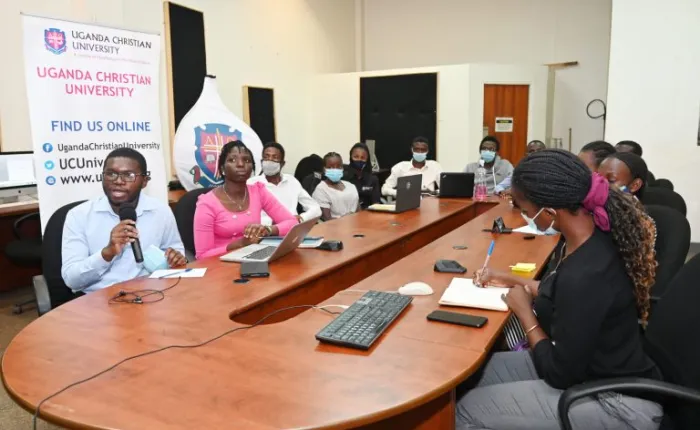By, Jude Kaddu and Nicole Nankya
The School of Journalism, Media and Communication hosted Thomas Froese, a Senior Journalist and founder Coordinator of The Standard, UCU’s newspaper and Prof. Ripley Smith, a lecturer at Bethel University Minnesota who gave a talk on “The Impact of Covid-19 on Journalism Practice” at the E-learning center at UCU Main campus.
The face to face session was attended by members of Faculty from the School of Journalism ,Media and Communication led by the Dean of the School , Prof. Monica Chibita and the School’s Head of Department Undergraduate studies, Mr. John Semakula and Lydia Mirembe a lecturer of the Post graduate programme along with students on the different journalism and communication programmes offered by the School. Others attended via Join Zoom Meeting.
Tom Froese said that Covid 19 is a pandemic of the century which reflects sharply on how journalists appropriately report on what is going on. He pointed out a whole new changing landscape in media reportage which however are exposing and challenging constantly the ethical values of neutrality and abstinence from inflammatory writing.

Professor Ripley called for new age aptitudes and skilling in appropriate technology such as multimedia applications in word processing, audio and video editing necessary for a digital environment. These multimedia opportunities are however being manipulated by influencers for example advertisers. From the ethical stand point, Professor Ripley encouraged journalism students to always tell the truth in the face of pressure from the advertisers adding that though the advertisers often influence the news stories the fair reasoning and skill of the reporter together with the editorial board decision making procedures enable journalism to hold its ethical ground. He pointed out that even some western media houses experience the problem of neutrality in their work. Listen : https://youtu.be/bRmNUxE_PEQ
Tom Froese suggested the BBC model in order to solve the neutrality problem in the Ugandan media industry. The BBC model is favourable because the advertiser’s power is controlled as the media is subsidised by the state, making the media less dependent on the advertisers for financial support.

The Dean School of Journalism,Media and Communication , Professor Monica Chibita commended the BBC model though she was quick to question the models appropriate power in the Ugandan context.
“I think that the BBC model or what was supposed to be the South Africa broadcasting corporation model and so on would be great if there were filters between the state and the BBC… the filters have broken down in some places so that being supported by government means actually being given money or denied money by government directly and we have Uganda Broadcasting Corporation (UBC)right now but they don’t have the kind of independence that the BBC has because the funding is not channeled through parliament and that kind of independence , there is a little bit of a more direct line of control ..it would be a great solution if the filters were there.” This contributes to the lack of neutrality in UBC’s coverage. Listen : https://youtu.be/bRmNUxE_PEQ
On the same note John Semakula pointed out that it is crucial for a journalist in Uganda to remain neutral, “..the best journalist should remain neutral in order to survive in this field.”
He said it is best for journalists to keep their political affiliation to themselves so as to avoid friction in their daily works of journalism.


